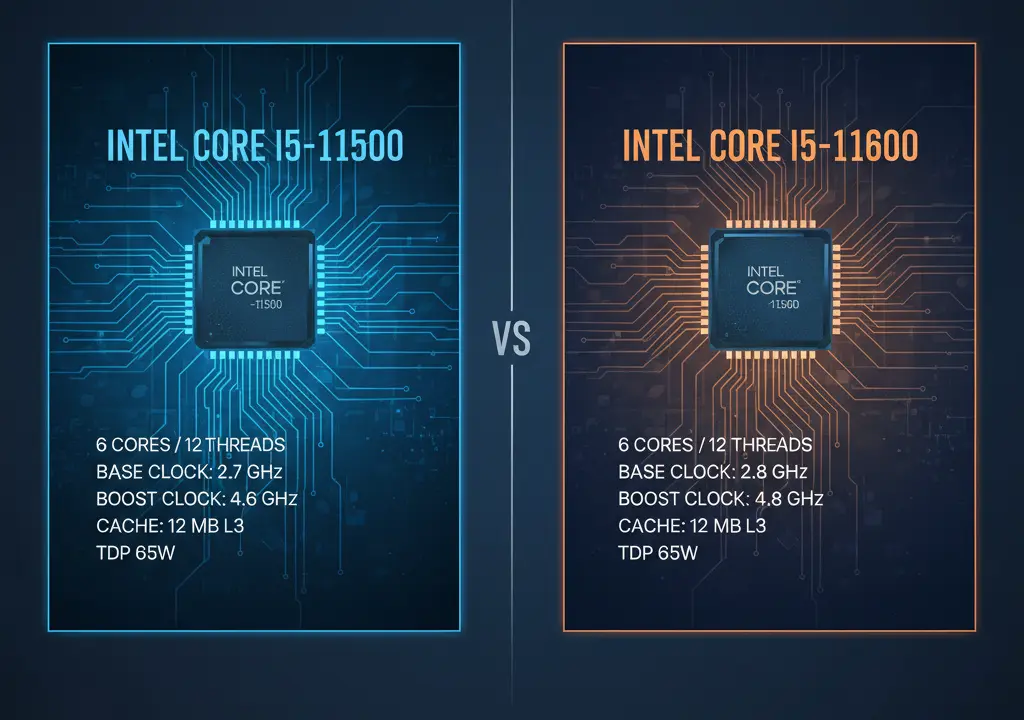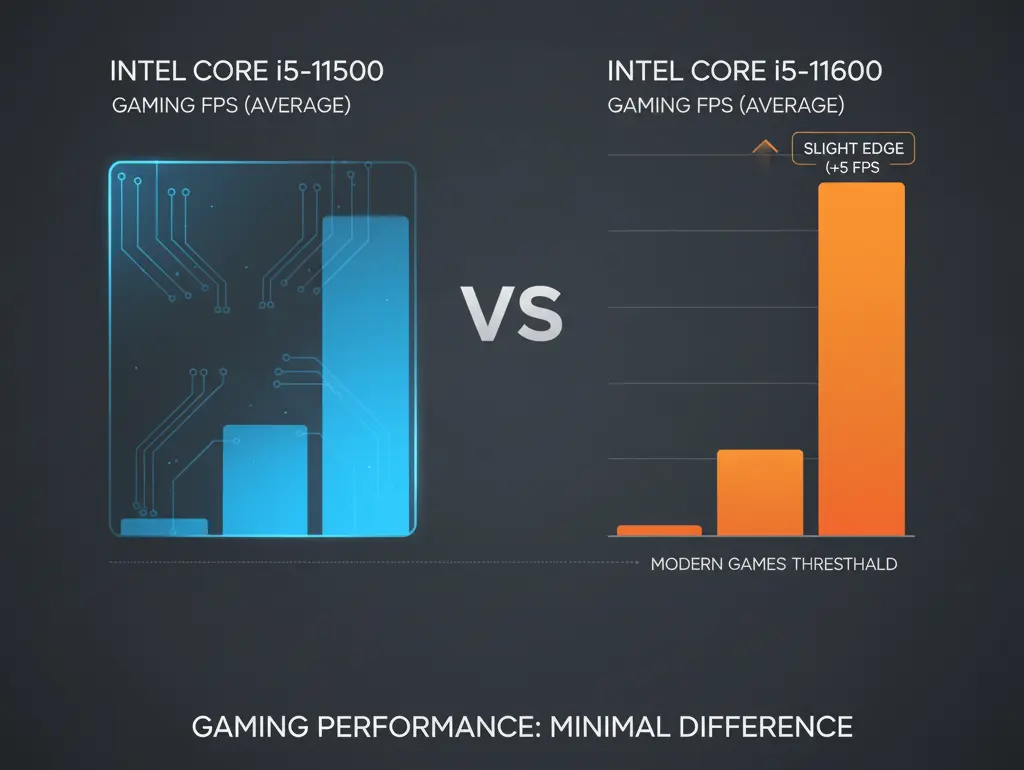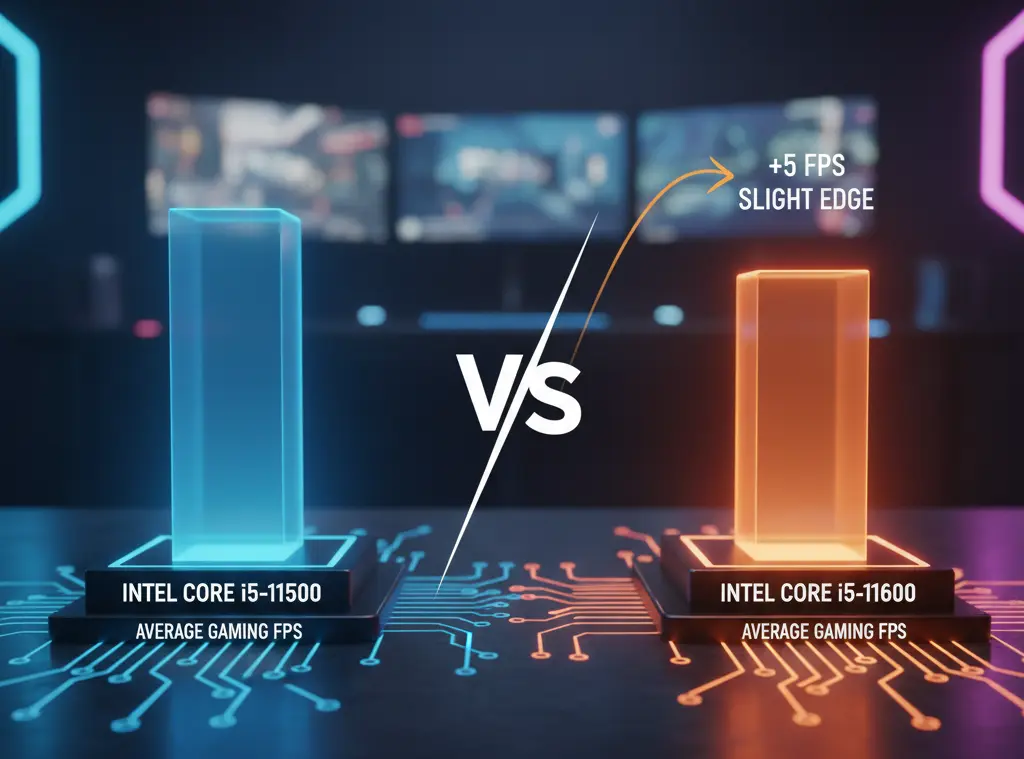Intel’s 11th Gen “Rocket Lake” processors brought a performance boost over their predecessors, and within the mid-range lineup, the Core i5‑11500 vs i5‑11600 are two popular contenders. While they share the same core count and a similar architecture, key differences in clock speeds and pricing can make one a better choice depending on your needs. This guide will help you understand what separates these two CPUs and determine which one is the more popular and practical choice for your new PC build.
When comparing Intel’s 11th Gen Rocket Lake CPUs, two models stand out: the Core i5‑11500 and Core i5‑11600. Both offer 6 cores and 12 threads, making them ideal for mainstream users, but subtle differences in performance and pricing influence their popularity. Let’s compare them in detail to see which one is more popular and why.
Which is More Popular i5 11500 or i511600?

When it comes to popularity, the i5-11600 edges ahead of the i5-11500. This is largely due to its slightly higher performance in gaming and productivity, making it more appealing to PC builders and gamers who want every bit of extra speed. On the other hand, the i5-11500 is more popular among budget-conscious buyers who prioritize cost savings while still enjoying reliable performance.
The answer to this question is definitive: the Intel Core i5-11500 was significantly more popular than the i5-11600. The reason for this popularity gap comes down to one simple, dominant factor: value for money.
In short:
- i5-11600 is more popular among gamers and enthusiasts.
- i5-11500 is more popular among budget builders and casual users.
Benchmark Comparisons (Gaming & Productivity)

Synthetic & Aggregate Benchmarks
| Benchmark / Metric | i5‑11500 | i5‑11600 | Difference |
|---|---|---|---|
| Aggregate Score | ~9.7 | ~10.2 | +4–5% advantage |
| PassMark CPU Mark | ~17,100 | ~17,900 | +5% advantage |
| GeekBench Single | ~2,000 | ~2,100 | +5% advantage |
| GeekBench Multi | ~7,200 | ~7,900 | +9% advantage |
Gaming Benchmarks
- In most modern games, the i5‑11600 delivers 2–5% higher FPS compared to the i5‑11500.
- In GPU‑bound titles, the difference is almost unnoticeable.
- Both CPUs can handle eSports titles at high frame rates, but the i5‑11600 has slightly better consistency in CPU‑intensive games.
Feature-by-Feature Comparison Table

| Feature | Intel Core i5‑11500 | Intel Core i5‑11600 |
|---|---|---|
| Architecture | Rocket Lake (14 nm) | Rocket Lake (14 nm) |
| Cores / Threads | 6 / 12 | 6 / 12 |
| Base Clock | 2.7 GHz | 2.8 GHz |
| Max Turbo Frequency | 4.6 GHz | 4.8 GHz |
| TDP | 65 W | 65 W |
| Integrated Graphics | Intel UHD 750 | Intel UHD 750 |
| Overclocking Support | No | No |
| Price at Launch | ~$192 | ~$213 |
Quick Highlights Table
| Category | Winner |
|---|---|
| Raw Speed | i5‑11600 |
| Multi‑Threaded | i5‑11600 |
| Gaming | i5‑11600 |
| Value | i5‑11500 |
| Everyday Use | Tie |
| Popularity | i5‑11600 |
Key Takeaways
The i5-11600 is a slightly more powerful CPU, outperforming the i5-11500 by roughly 5% in both multi-threaded and single-threaded benchmarks. This performance gap is directly related to its higher base and turbo clock speeds. While this may not be a massive difference in real-world scenarios like gaming, it provides a noticeable edge in productivity tasks and applications that can take advantage of the extra clock speed. Both processors share the same core count, cache size, TDP, and integrated graphics, making them very similar on paper. The choice between them ultimately comes down to the price-to-performance ratio.
- The i5‑11600 is slightly more powerful, especially in benchmarks and gaming.
- The i5‑11500 is more affordable, offering nearly identical performance for most casual users.
- Popularity favors the i5‑11600 among gamers and PC enthusiasts, while the i5‑11500 is favored by budget‑conscious buyers.
Pros & Cons of Core i5‑11500 and i5‑11600
Intel Core i5-11500
Pros:
- Excellent Value: Often sold at a lower price point, providing a great balance of performance and affordability.
- Efficient: With a 65W TDP, it’s easy to cool with a stock cooler or a basic aftermarket solution.
- Strong Performance: Still a highly capable processor for gaming and general productivity.
Cons:
- Lower Clocks: Slower base and boost clocks compared to the i5-11600.
- Limited Overclocking: Not designed for overclocking, unlike the “K” series CPUs.
Intel Core i5-11600
Pros:
- Slightly Higher Performance: The boost in clock speed gives it a small but clear performance advantage.
- Good for Productivity: The extra speed can be beneficial for tasks like video editing and 3D rendering.
Cons:
- Higher Price: The minor performance gain comes at a cost, making it a less popular value proposition than the i5-11500.
- No Overclocking: Like the 11500, it lacks the overclocking capabilities of its “K” series counterpart, the i5-11600K.
Buying Recommendations
For most users, the i5-11500 is the clear winner for its value. It delivers nearly the same performance as the i5-11600 at a lower price, allowing you to reallocate funds to a better GPU, more RAM, or faster storage. The i5-11600 only makes sense if the price difference is negligible, as its performance bump is marginal. Given that these are older CPUs, finding them in stock at a reasonable price might be challenging, so their availability should also be a deciding factor.
- Choose i5‑11500 if you want a budget-friendly build for office work, streaming, and casual gaming.
- Choose i5‑11600 if you want a gaming-oriented build or a CPU with a little more future headroom.
- Consider the i5‑11600K if you need overclocking support.
Final Verdict
The i5‑11600 is more popular thanks to its stronger performance in gaming and productivity benchmarks. However, the i5‑11500 still provides exceptional value, delivering nearly identical results at a lower price. For budget builds, go with the 11500; for performance builds, the 11600 is the smarter choice.
While the Intel Core i5-11600 is technically the more powerful processor, the i5-11500 is generally considered the more popular choice due to its superior price-to-performance ratio. The minimal performance difference between the two doesn’t justify the typically higher cost of the i5-11600. For a budget-conscious builder, the i5-11500 is the smarter, more practical option.
FAQ of Intel Core i5‑11500 vs i5‑11600
Q1: Which CPU is better for gaming?
The i5‑11600, thanks to its higher boost clock.
Q2: Is the difference noticeable in daily use?
Not really — both feel nearly identical for browsing, office, and streaming.
Q3: Which CPU is more popular?
The i5‑11600, especially among gamers.
Q4: Do both come with integrated graphics?
Yes, both use Intel UHD 750.
Q5: Can I overclock either CPU?
No, only the K‑series versions allow overclocking.
Q6: Which one is better long-term?
The i5‑11600, as it has slightly higher performance margins.
Q7: Which one offers better value?
The i5‑11500, since it’s cheaper but very close in performance.
Q8: Is the i5-11600 better for gaming than the i5-11500? The performance difference in most modern games is very small, often just a few frames per second. Both are excellent choices for gaming, and the i5-11500 paired with a better graphics card will almost always outperform an i5-11600 with a lesser GPU.
Q9: Do these CPUs come with a stock cooler? Yes, both the i5-11500 and i5-11600 come with a basic Intel stock cooler. For general use, this is sufficient. For heavier workloads or to maintain lower temperatures, an aftermarket cooler is recommended.
Q10: Can I overclock the i5-11500 or i5-11600? No, neither of these CPUs can be overclocked. Overclocking is reserved for Intel’s “K” series processors, such as the i5-11600K.
Q11: What is the difference between the i5-11500 and the i5-11600K? The i5-11600K has a higher base and boost clock, a higher TDP (125W), and is unlocked for overclocking. The i5-11500 has a lower TDP and cannot be overclocked.
Q12: Are these CPUs still a good value in 2025? Both CPUs are now a few generations old. While still capable for most tasks, newer CPUs like the 12th, 13th, or 14th Gen Intel Core processors and AMD’s Ryzen series offer better performance per watt and more advanced features. They are best considered for upgrading an existing LGA 1200 motherboard.
Q13: What motherboards are compatible with these CPUs? Both processors require an LGA 1200 socket and are compatible with Intel’s 400 series (like B460 and Z490, though some may require a BIOS update) and 500 series motherboards (B560, H570, and Z590).
Q14: Is the i5-11500 still a more popular choice than the i5-11600? Based on their initial price points and the value they offered at the time of release, the i5-11500 was generally seen as a better buy. Its enduring reputation as a solid value CPU makes it a popular point of comparison even years later, though specific sales data is difficult to find.
Short Conclusion
In the battle of the mid-range “Rocket Lake” CPUs, the Intel Core i5-11500 narrowly edges out the i5-11600. While the i5-11600 has a slight performance advantage, the more significant factor for most buyers has been the i5-11500’s superior value. It offers an excellent combination of performance and efficiency for a budget that won’t break the bank.
The Intel Core i5‑11600 is the more popular choice, mainly for gaming and enthusiast builds, while the i5‑11500 is a cost‑effective alternative for everyday use. Both are excellent CPUs — your choice depends on whether you value raw performance or price efficiency.
If you have any questions about “Intel Core i5‑11500 vs i5‑11600: Which CPU Is More Popular?,” then feel free to let us know through your comments.



